JOHN MILLS WHITHAM
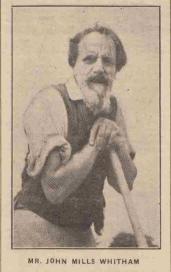
John Mills Whitham as pictured in 1935
John Mills Whitham lived in the village of Parracombe in Devon where he stated his work was as an author. In spring of 1916 compulsory military service was introduced in Great Britain and like many others he refused to fight on religious grounds.
Born in 1883 the 1891 Census shows him as an eight year old living with his family in Ellesmere Port. His father is described as a Primitive Methodist Minister and the differing birthplaces of the three young children show that the family had moved around in the previous ten years.
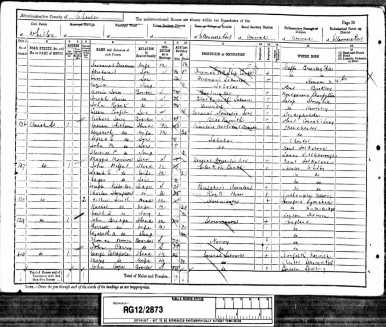
1901 finds John living with his grandfather in Birkenhead where he is described as an architect’s pupil, and by 1911 he is living with his married elder brother Alfred, himself then a Wesleyan Methodist Minister, in Southend on Sea. John is described as a writer – also advertisement writer working partly on his own account.
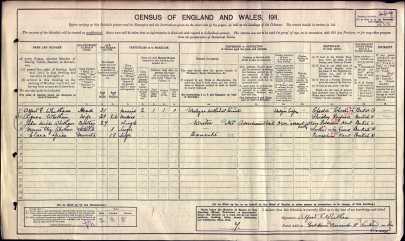
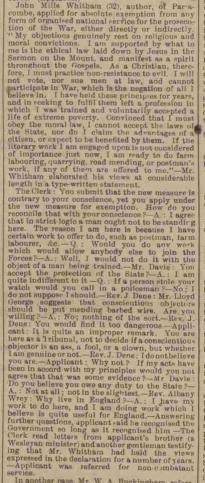 In March 1916 John attended a Tribunal to assess his application for absolute exemption from any form of organised National Service for the prosecution of the War. This was reported in the North Devon Journal on the 23rd March of that year.
In March 1916 John attended a Tribunal to assess his application for absolute exemption from any form of organised National Service for the prosecution of the War. This was reported in the North Devon Journal on the 23rd March of that year.
At this time the Tribunals were exactly the same ones that were set up to facilitate recruitment for the army and so had little sympathy for the men who appeared before them.
It is known that John’s Service No. was 3665 and that he was only exempted from the Combatant Service but was expected to serve in the Non-Combatant Corps which was a corps of the British Army composed of conscientious objectors as privates with NCO’s and Officers seconded from other corps or regiments.
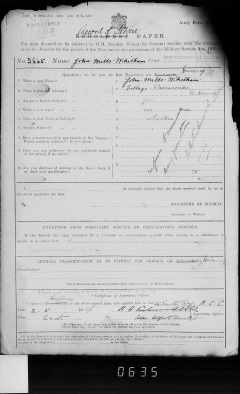 All of his army enrolment papers, medical papers and discharge papers give no personal information with the exception that he is an author. He refused , always to answer any questions and it was this that was noted on his record of service.
All of his army enrolment papers, medical papers and discharge papers give no personal information with the exception that he is an author. He refused , always to answer any questions and it was this that was noted on his record of service.
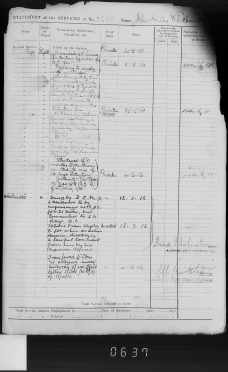 It can be seen from the attached information and statement of service that John was frequently court martialed and imprisoned. He was finally discharged in 1920, still refusing to answer any personal questions. John Mills Whitham was married to Sylvia Milman in 1916 and lived the rest of his life in North Devon. She was the daughter of a barrister from South Kensington and, as an artist and Royal Academician, had been a member of the “Friday Club” started by Vanessa Bell.
It can be seen from the attached information and statement of service that John was frequently court martialed and imprisoned. He was finally discharged in 1920, still refusing to answer any personal questions. John Mills Whitham was married to Sylvia Milman in 1916 and lived the rest of his life in North Devon. She was the daughter of a barrister from South Kensington and, as an artist and Royal Academician, had been a member of the “Friday Club” started by Vanessa Bell.
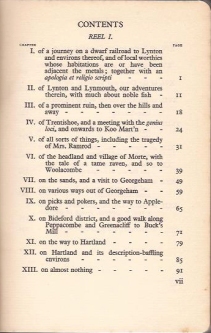 John, or Jan as he was also known, was a fairly prolific and moderately successful local author. He was a friend of Henry Williamson who records a meeting with him at Trentishoe in his 1933 walking travelogue On Foot in Devon, referring to him in the index as the genius loci.
John, or Jan as he was also known, was a fairly prolific and moderately successful local author. He was a friend of Henry Williamson who records a meeting with him at Trentishoe in his 1933 walking travelogue On Foot in Devon, referring to him in the index as the genius loci.
The Henry Williamson Society website says of the encounter Our author meets John (‘Jan’) Mills-Whitham, author and friend of HW, who is given a succinct verbal portrait but needs further notes to fully flesh him out.
An account of his life and career was published in the North Devon Journal in 1935. He died at the North Devon Infirmary in Barnstaple in 1956, after which his widow Sylvia donated his correspondence and manuscript notes to the University of Exeter, before she herself died in the following year. A number of his books may be seen in the Local Studies collection at Devon Heritage Centre, Exeter.
Sources
Ancestry Library Edition – Census records; WW1 service records (available free online in the Local Studies Centre and in any Devon library)
British Newspaper Archive – North Devon Journal (available free online in the Local Studies Centre)
On Foot in Devon notes – http://www.henrywilliamson.co.uk/bibliography/a-lifes-work/on-foot-in-devon
CONSCRIPTION
The start of conscription in Spring of 1916 meant the setting up of Tribunals to assess Conscientious Objectors. It was expected that the Tribunals would be independent judicial bodies presided over by fair-minded men and women.They were, however, exactly the same Tribunals which had been set up to facilitate recruitment for the army and continued to fulfil that function. Their task was , therefore , difficult since nobody had established any guidelines and they had little sympathy for the men who appeared before them.
CONSCIENTIOUS OBJECTORS
A conscientious objector refuses to engage in military
Service or go to war because doing so would conflict
with deeply held personal beliefs.
These can be based on religious conviction or experience,
or moral and ethical considerations.
The Non-Combatant Corps was a corps of the British Army composed of conscientious objectors as privates, with NCOs and officers seconded from other corps or regiments.Its members fulfilled various non-combatant roles in the army during the first world war.
John Mills Whitham
As reported in the North Devon Journal on the 23rd March 1916, John Mills Whitham was sent before a Military Service Tribunal in Barnstaple in that month. His stated objection to fighting was on religious grounds. He was not granted absolute exemption, however , only exemption from combatant service. This meant that he was expected to join the Non- Combatant Corps.
John Mills Whitham always refused to answer any questions or give any personal information to the army except to say that he is an author.
It can be seen from his record that he frequently disobeyed orders and spent some time in military and civilian prisons. He was finally discharged in March 1920, still refusing to answer any personal questions.
John Mills Whitham was married to Sylvia Milman in 1916 and lived the rest of his life in North Devon.He was a fairly prolific and moderately successful local author.
Whilst John Mills Whitham did not appear to speak of his first world war experiences and no mention of this time is made in articles about him,and even tho’ he was so reticent about himself during that war it is highly likely that the unusual name, the date of birth of 1883/4, put together with the mention of a brother who is a Wesleyan Minister both during the Tribunal and in the obituary and the fact of being an author, add up to the John Mills Whitham who was a conscientious objector in 1916 as being the author about whom an article was written in the North Devon Journal in December 1935 and who died in 1956..
The later life of John Mills Whitham is fairly well documented as can be seen in the papers included here.
PP



